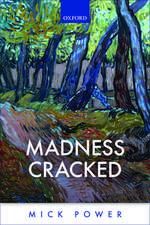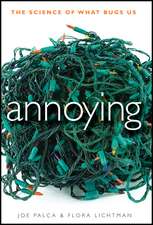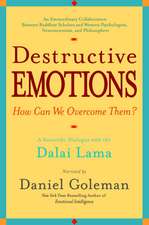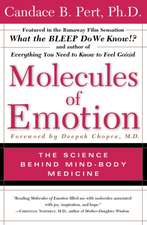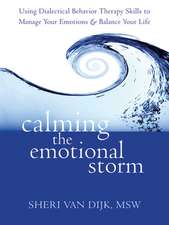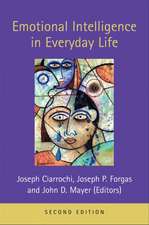Cognition and Emotion: From order to disorder
Autor Mick Power, Tim Dalgleishen Limba Engleză Paperback – 21 aug 2015
The book provides a comprehensive review of the basic literature on cognition and emotion – it describes the historical background and philosophy of emotion, reviews the main theories of normal emotions and emotional disorders, and the research on the five basic emotions of fear, anger, sadness, anger, disgust and happiness. The authors provide a unique integration of two areas which are often treated separately: the main theories of normal emotions rarely address the issue of disordered emotions, and theories of emotional disorders (e.g. depression, post-traumatic stress disorder, and phobias) rarely discuss normal emotions. The book draws these separate strands together, introducing a theoretical framework that can be applied to both normal and disordered emotions.
Cognition and Emotion provides both an advanced textbook for undergraduate and postgraduate courses in addition to a novel approach with a range of implications for clinical practice for work with the emotional disorders.
| Toate formatele și edițiile | Preț | Express |
|---|---|---|
| Paperback (1) | 495.51 lei 43-57 zile | |
| Taylor & Francis – 21 aug 2015 | 495.51 lei 43-57 zile | |
| Hardback (1) | 1344.36 lei 43-57 zile | |
| Taylor & Francis – 21 aug 2015 | 1344.36 lei 43-57 zile |
Preț: 495.51 lei
Nou
Puncte Express: 743
Preț estimativ în valută:
94.85€ • 103.06$ • 79.72£
94.85€ • 103.06$ • 79.72£
Carte tipărită la comandă
Livrare economică 21 aprilie-05 mai
Preluare comenzi: 021 569.72.76
Specificații
ISBN-13: 9781848722682
ISBN-10: 1848722680
Pagini: 472
Ilustrații: 122
Dimensiuni: 174 x 246 x 25 mm
Greutate: 0.6 kg
Ediția:Revised
Editura: Taylor & Francis
Colecția Psychology Press
Locul publicării:Oxford, United Kingdom
ISBN-10: 1848722680
Pagini: 472
Ilustrații: 122
Dimensiuni: 174 x 246 x 25 mm
Greutate: 0.6 kg
Ediția:Revised
Editura: Taylor & Francis
Colecția Psychology Press
Locul publicării:Oxford, United Kingdom
Public țintă
Postgraduate, Professional, and UndergraduateCuprins
1. Introduction Part One – Philosophy And Theory 2. The Cognitive Philosophy of Emotion 3. Cognitive Theories of Emotion 4. Cognitive Theories of Emotional Disorder 5. Towards an Integrated Cognitive Theory of Emotion: The Spaars Approach Part Two - Basic Emotions and Their Disorders 6. Fear 7. Sadness 8. Anger 9. Disgust 10. Happiness 11. Overview and Conclusions
Notă biografică
Mick Power is a Professor of Clinical Psychology at the National University of Singapore. In the past he has worked at universities and hospitals in London, Edinburgh, Norway, Italy, China and New Zealand. He has worked for the Medical Research Council and for many years has been a Research Advisor with the World Health Organization.
Tim Dalgleish is a Senior Research Scientist and practising clinical psychologist at the Medical Research Council Cognition and Brain Sciences Unit in Cambridge. His main research interests include psychological reactions to trauma and cognition-emotion relations in the emotional disorders.
Tim Dalgleish is a Senior Research Scientist and practising clinical psychologist at the Medical Research Council Cognition and Brain Sciences Unit in Cambridge. His main research interests include psychological reactions to trauma and cognition-emotion relations in the emotional disorders.
Recenzii
'This third edition of Cognition and Emotion remains an essential reference for both the clinician and the researcher in cognitive psychopathology. After presenting the historical and philosophical roots of cognition and emotion research, it provides a clear and synthetic presentation of how cognition concurs to emotion, how emotion becomes disordered, and how it can be cured.' - Pierre Philippot, Psychological Sciences Research Institute, University of Louvain, Belgium
Descriere
This new edition of the highly praised Cognition and Emotion provides both an advanced textbook for undergraduate and postgraduate courses on cognition and emotion in addition to a novel approach with a range of implications for clinical practice for work with the emotional disorders.


